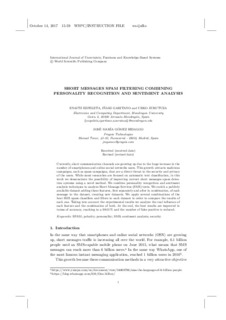
Título
Short Messages Spam Filtering Combining Personality Recognition and Sentiment AnalysisAutor-a (de otra institución)
Fecha de publicación
2017Versión
PostprintTipo de documento
ArtículoArtículoIdioma
InglésDerechos
© World Scientific Publishing Company. Electronic version of an article published as International Journal of Uncertainty, Fuzziness and Knowledge-Based Systems. Vol. 25. Nº. Suppl. 2. December, 2017 https://www.worldscientific.com/worldscinet/ijufksAcceso
Acceso abiertoVersión de la editorial
https://doi.org/10.1142/S0218488517400177Publicado en
International Journal of Uncertainty, Fuzziness and Knowledge-Based Systems Vol. 25. Nº. Suppl. 2. December, 2017Editorial
World Scientific PublishingPalabras clave
spam
polarity
SMS
sentiment analysis ... [+]
polarity
SMS
sentiment analysis ... [+]
spam
polarity
SMS
sentiment analysis
security [-]
polarity
SMS
sentiment analysis
security [-]
Resumen
Currently, short communication channels are growing up due to the huge increase in the number of smartphones and online social networks users. This growth attracts malicious campaigns, such as spam ca ... [+]
Currently, short communication channels are growing up due to the huge increase in the number of smartphones and online social networks users. This growth attracts malicious campaigns, such as spam campaigns, that are a direct threat to the security and privacy of the users. While most researches are focused on automatic text classification, in this work we demonstrate the possibility of improving current short messages spam detection systems using a novel method. We combine personality recognition and sentiment analysis techniques to analyze Short Message Services (SMS) texts. We enrich a publicly available dataset adding these features, first separately and after in combination, of each message to the dataset, creating new datasets. We apply several combinations of the best SMS spam classifiers and filters to each dataset in order to compare the results of each one. Taking into account the experimental results we analyze the real inuence of each feature and the combination of both. At the end, the best results are improved in terms of accuracy, reaching to a 99.01% and the number of false positive is reduced. [-]
Sponsorship
Gobierno VascoID Proyecto
GV/Proyectos de Investigación Básica y Aplicada 2014-2016/PC2014-08/CAPV/Seguimiento y filtrado de spam personalizado en medios sociales mediante modelos de difusión y análisis del contenido/SOCIALSPAMColecciones
- Artículos - Ingeniería [763]




















